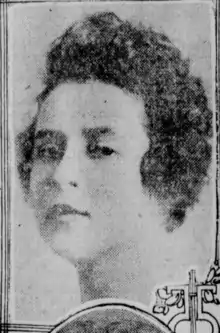Ariadna Mikeshina Ариадна Михайловна Микешина | |
|---|---|
 Mikeshina, from a 1920 newspaper. | |
| Background information | |
| Birth name | Ariadna Roumanova |
| Born | October 17, 1900 Russia |
| Died | May 18, 1982 (aged 81) United States |
| Genres | Classical |
| Occupation(s) | Pianist, composer |
| Instrument(s) | Piano |
| Years active | 1918–1975 |
| Spouse(s) |
|
Ariadna Mikeshina (Russian: Ариадна Михайловна Микешина; October 17, 1900 – May 18, 1982), earlier known as Ariadna Roumanova, was a Russian-born pianist and composer.
Early life
Ariadna Roumanova was the daughter of an admiral in the Russian navy.[1] She was trained as a musician at the imperial conservatory in St. Petersburg.[2] Her brother-in-law Leonid Bolotine was a violinist and later a guitarist.[3]
Career
Roumanova was called "a brilliant pianist and a most interesting composer" when she relocated to the United States in 1918.[2] While in Los Angeles, she gave concerts,[4] sometimes featuring her own compositions, and accompanied others in recital.[5][6] She also appeared in the 1922 silent film adaptation of the Rubaiyat,[7] and taught piano students in her studio.[8]
As Ariadna Mikeshina,[9] she performed regularly in Los Angeles[10] New York City[11][12] into her seventies.[13] In 1927 the Los Angeles Times described her as a composer, having "marked talent, but not excessive originality".[14] She was described in 1975 as "calmly ignor[ing] the last 75 years of musical thought" in a recital at Carnegie Hall.[15]
Personal life
Mikeshina was married at least five times.[16] Her first husband was journalist Michel Roumanoff, who served in the Russian Provisional Government. She moved to Tokyo with Roumanoff when he was a diplomat at the Russian mission there; the couple moved to California[17] when the Kerensky government fell.[1][8] Her mother, brother and sister became refugees in Constantinople by 1921, when she divorced Roumanoff[18] and went to join them.[19] She returned to the United States with them in 1923, using the surname "Mikeshina".[20] Her fourth husband was cellist Lev Ter-Oganov and her fifth husband was trombonist Vincent O. Clarke; the Clarkes married in 1952 and divorced in 1958.[16]
After her death in 1982, at age 81, a collection of her musical manuscripts was donated to the Russian State Archive of Literature and Art.[21] Other papers of hers are in the Elena Mogilat Papers at Columbia University,[22] and in the Yeichi Nimura and Lisan Kay Nimura papers at the New York Public Library.[23]
She is buried at the Russian Orthodox Convent Novo-Diveevo in Nanuet, New York.
References
- 1 2 "Musicale at Home of Mrs. Emrich" Near East Relief (May 20, 1922): 2.
- 1 2 "Russian Concert Program Arranged" Los Angeles Evening Herald (March 20, 1920): B6. via California Digital Newspaper Collection

- ↑ "Leonid Bolotine, 87, Violinist and Guitarist" New York Times (November 29, 1988): B12.
- ↑ "Beckers in Los Angeles" Musical America (April 10, 1920): 36.
- ↑ "Mrs. Dreyfus on Coast" Musical America (May 14, 1921): 46.
- ↑ "Grace Wood Jess Charms in Folk Song Program" Musical Courier (February 19, 1920): 42.
- ↑ "Art Notables in Rubaiyat" Los Angeles Sunday Times (August 7, 1921): 36. via Newspapers.com

- 1 2 "Russian Composer-Pianist" Los Angeles Times (September 28, 1919): 57. via Newspapers.com

- ↑ "Mikeshina's Music Heard" New York Times (May 4, 1949): 38. via ProQuest
- ↑ Isabel Morse Jones, "Rare Poise in Koshetz Delineation" Los Angeles Times (December 18, 1929): 31. via Newspapers.com

- ↑ E. D., "Mme. Mikeshina Plays" New York Times (October 17, 1955): 35. via ProQuest
- ↑ Ellsworth R. Groce, "Music Maestro" New York Age (October 29, 1955): 8. via Newspapers.com

- ↑ John Rockwell, "Mikeshina Concert Held at Town Hall" New York Times (October 15, 1973): 53. via ProQuest
- ↑ "Women Composers Accorded Hearing" Los Angeles Times (February 14, 1927): 25. via Newspapers.com

- ↑ John Rockwell, "Ariadna Mikeshina Presents Her Music" New York Times (October 13, 1975): 31. via ProQuest
- 1 2 Alfred Albelli, "Horn Blower Sinks her Alimony Barge" Daily News (January 7, 1958): 5. via Newspapers.com

- ↑ "Bring to American Music of Russia" The Daily Colonist (June 12, 1918): 9.
- ↑ "Russian Beauty" Indianapolis Star (July 6, 1923): 13. via Newspapers.com

- ↑ "Russian Woman to Rescue her Family" Los Angeles Evening Herald (September 16, 1921): A14. via California Digital Newspaper Collection

- ↑ "Five Liners Arrive with Immigrants" New York Times (July 3, 1923): 2. via ProQuest
- ↑ "Консульство: редкие записи композитора Микешиной будут переданы России" музкарта.рф (04 ноября 2015).
- ↑ Elena Mogilat Papers, Columbia University Libraries, Rare Book & Manuscript Library.
- ↑ Yeichi Nimura and Lisan Kay Nimura papers, The New York Public Library, Jerome Robbins Dance Division.